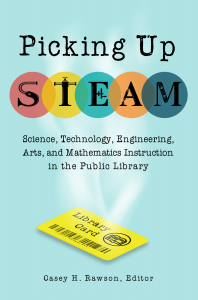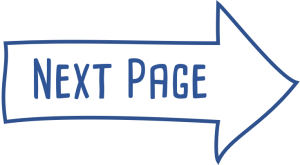 Welcome to the homepage for Picking up STEAM: Science, Technology, Engineering, Arts, and Mathematics Instruction in the Public Library, a collaboratively written textbook licensed for reuse and sharing under Creative Commons. On this site, you can:
Welcome to the homepage for Picking up STEAM: Science, Technology, Engineering, Arts, and Mathematics Instruction in the Public Library, a collaboratively written textbook licensed for reuse and sharing under Creative Commons. On this site, you can:
- Download a complete PDF copy of the book (coming soon!)
- Read the complete text online using the menu on the right.
- Download an EPUB version of the book (coming soon!).
- Purchase a print copy of the book via Lulu.
What is this book about?
Science. Technology. Engineering. Art. Mathematics. Individually, three of these subjects have long histories in formal K-12 education environments (with technology and engineering being more recent additions to public school curricula). Together, they represent a critical set of literacies that today’s children and teens must possess to fully understand the world in which they live – and the world they will help to create.
While few would argue that STEAM education is important for children and teens, the reality is that not every young person has access to high quality STEAM resources and teaching through the public school system. Because schools are structured around defined standards and curricula, there are also valuable elements of STEAM education that aren’t currently being taught in formal education environments. Informal learning organizations such as museums and parks play a critical role in supporting and complementing more formalized STEAM instruction, but opportunities to learn in these environments are also unevenly distributed. Fortunately, there is another public institution with the potential to address these gaps and provide high-quality STEAM instruction to all children and teens: the public library.
In this book, we argue that far from being “another thing” that extends the scope of public library work beyond its core mission, STEAM instruction is in fact a means for public libraries to enact that core mission. Public librarians and public libraries around the country are already offering incredible STEAM programming, many examples of which will be highlighted in this book. By shifting our thinking to reframe that programming as instruction, we can make our library services more equitable, more empowering, and more impactful.
Who are the authors?
This book was written by the instructor and students of a graduate-level course for preservice school and public youth services librarians titled Instruction for Youth in School and Public Libraries. The instructor, Dr. Casey H. Rawson, edited the text and wrote or co-wrote several chapters. Other chapter authors include:
- Jesse Akman (Chapter 7)
- Megan Boland (Chapter 10)
- Nadia Clifton (Chapter 12)
- Ellie Edwards (Chapter 4)
- Catherine Gallagher (Chapter 6)
- Cait Kennedy (Chapter 12)
- Amelia Midgett-Nicholson (Chapter 1)
- Brittany Norwood (Chapter 8)
- Alyssa Putt (Chapter 9)
- Kristen Stockdale (Chapter 11)
- Allison Thompson (Chapter 2)
- Faith Wahlers (Chapter 8)
- Lauren Wise (Chapter 10)
- Kat Zimmerman (Chapter 3)
For more about the authors, see the About This Book page.
How can I use this book?
This book is published under a CC BY-NC-SA 3.0 license, which means that you can copy, redistribute, remix, transform, and build upon the content for any non-commercial purpose as long as you give appropriate credit, provide a link to the license, and indicate if changes were made. If you remix, transform, or build upon the material, you must distribute your contributions under the same license as the original.
License details: https://creativecommons.org/licenses/by-nc-sa/3.0/
If you use this book for a course you teach or as a personal or organizational professional development text, we would love to hear about it! Please let us know by emailing the editor, Dr. Casey Rawson.
Funding
![]() This project has been generously funded by a grant from EBSCO Information Services.
This project has been generously funded by a grant from EBSCO Information Services.
Image Credits
Header images (clockwise from top left) licensed for reuse under Creative Commons by Lester (WI) Public Library, Harris County (TX) Public Library, Lester (WI) Public Library, Madison (WI) Public Library, Omaha (NE) Public Library, San Jose (CA) Public Library, Plano (TX) Public Library, Lester (WI) Public Library, and Harris County (TX) Public Library.
